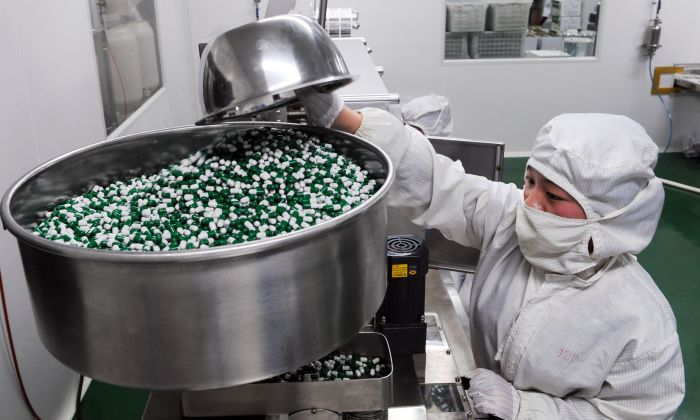Trump’s CDC Visit Back on After Cancellation Over Suspected Coronavirus Case
News Analysis
The COVID-19 coronavirus supply chain disruption has exposed the existential healthcare risk from China manufacturing 80 percent of medications consumed in the United States.
The U.S.-China Economic and Security Review Commission testified to a Joint Session of Congress on July 31, 2019 regarding “The Growing U.S. Reliance on China’s Biotech and Pharmaceutical Products.” Senator Jim Talent stated at the hearing: “China’s market power continues to expand, U.S. consumers are becoming increasingly reliant on drugs sourced from the country which presents economic and national security risks.”
China exports account for 13.4 percent of U.S. drugs and 39.3 percent of medical device purchases. But the report highlighted that China supplies 80 percent of active pharmaceutical ingredients (APIs) for pharmaceutical companies around the world, despite “serious deficiencies in health and safety standards in China’s pharmaceutical sector and inconsistent and ineffective regulation by the Chinese Government.”
Rosemary Gibson, senior advisor at The Hastings Center bioethics research institute and author of “China Rx: Exposing the Risks of America’s Dependence on China for Medicine,” provided a testimony to Congress. She stated that the centralization of the global supply chain of medicines in a single country makes it vulnerable to interruption, “whether by mistake or design.” She said the United States’ dependence on China for medicinal drugs can be used as a weapon to dominate and displace American companies.
The Council on Foreign Relations (CFR) quoted an influential Chinese economist that China should retaliate in the Sino-U.S. trade war with export curbs on raw materials for vitamins and antibiotics. CFR credits the threat for explaining why “pharmaceuticals, certain pharmaceutical inputs, and select medical goods” imports were exempted by the U.S. Trade Representative from $300 billion of proposed China tariffs in May 2019.
Although the United States was rated in the 2019 CPhI Pharma Index Report as number one in “overall competitiveness,” European companies that traditionally led in pharmaceutical design and production were first to outsource to China joint-ventures.
Despite now dominating global production, the 2019 Pharma Index rated China worst in manufacturing efficiency; worst in quality of finished product; and second worst for innovation. China was number one in growth and competitive improvement.
The United States territory of Puerto Rico was the fastest growing manufacturing hub for pharmaceuticals after Congress in 1976 passed a tax code change, title Section 936, that exempted corporate profit taxes for pharmaceutical drugs manufactured in Puerto Rico.
American Pharma giants including Pfizer, Bristol-Myers Squibb, Merck, Mylan, Eli Lilly built state-of-the-arts facilities and hired many thousands of U.S. citizens on the island territory. But after the Clinton administration led the effort to eliminate the tax incentive in 1996, much of the production was off-shored to China joint-ventures.
A key justification for the Trump administration launching the Sino-U.S. trade war was based on the Chinese authorities financing manufacturer’s predatory pricing practices. Chinese enterprises have been able to sell products below average costs to bankrupt competitors and gain market dominance; then profit by raising prices. The U.S. pharmaceutical companies were huge beneficiaries of these practices, until the coronavirus hit.
China’s official coronavirus reporting has been questioned by experts and authorities, but the outbreak’s impact on businesses helps to gauge the severity of the crisis. The European Chamber of Commerce on Feb. 27 published a report on the effects of COVID-19 on its 577 member companies operating in China. The report found that 59 percent rated the coronavirus impact as high; 29 percent reported medium impact; 8 percent reported low impact; and 4 percent stated that it was too early to tell. Over a quarter of respondents also “forecast a double-digit drop in revenues for the first half of 2020” due to “unpredictable rules, highly restrictive quarantine demands and extensive pre-conditions to restart operations.”
Strategic risk consultant William Engdahl commented in the New Eastern Outlook online magazine that the ongoing health emergency across China has made starkly clear that 30 years of globalism’s outsourcing to China “now threatens vital world supply chains to the rest of the world.”
This article is from the Internet:Precarious Risk From China Producing 80 Percent of US Medications
Three Biogen Workers Test Positive for New Coronavirus After Boston Meeting
